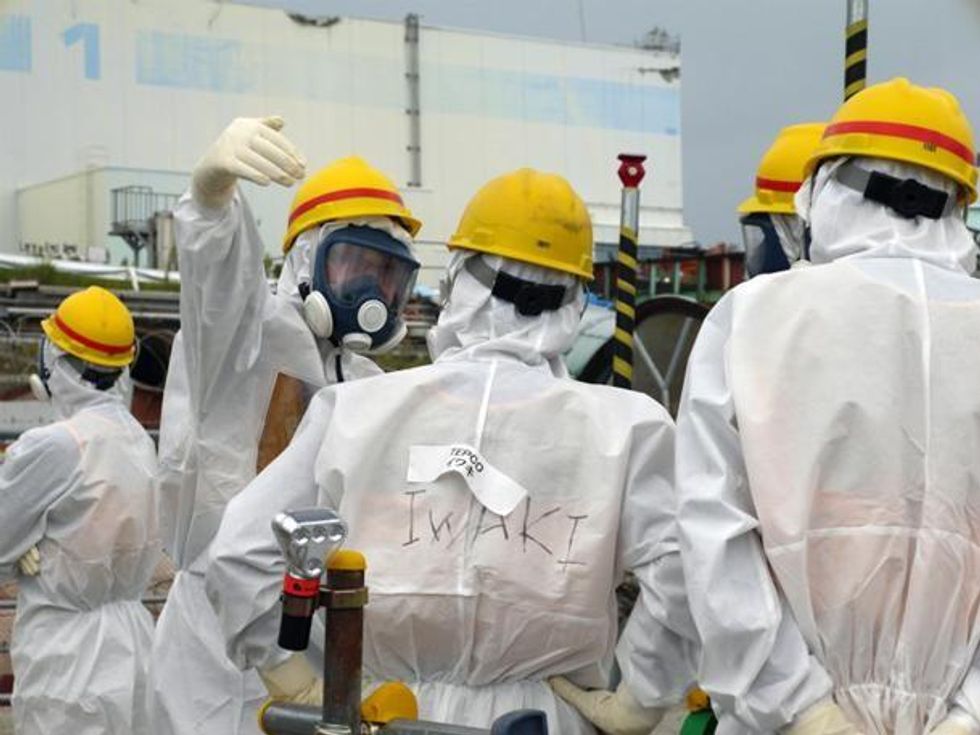

SUBSCRIBE TO OUR FREE NEWSLETTER
Daily news & progressive opinion—funded by the people, not the corporations—delivered straight to your inbox.
5
#000000
#FFFFFF
To donate by check, phone, or other method, see our More Ways to Give page.


Daily news & progressive opinion—funded by the people, not the corporations—delivered straight to your inbox.

Unlike a number of other nations including the U.S., Japan has never undergone a decommissioning process and currently has no experts at the regulatory level even devoted to decommissioning, said Nuclear Regulation Authority spokesman Juntaro Yamada.
The AP story follows a growing call from nuclear watchdog groups and experts, including Harvey Wasserman and veteran U.S. nuclear engineer Arnie Gundersen, for a "global takeover" of the decommissioning process, saying: "Neither Tokyo Electric nor the government of Japan can go this alone. There is no excuse for deploying anything less than a coordinated team of the planet's best scientists and engineers."
Echoing that demand, nuclear engineering professor Akira Tokuhiro, told the AP that "even for the U.S. nuclear industry, such a cleanup and decommissioning would be a great challenge.''
Advocating for an international team of experts to help tackle increasingly dangerous situation in Fukushima, Tokuhiro added, ''It is clear that this very large undertaking requires an international effort.''
AP continues:
Decommissioning a nuclear power plant normally involves first bringing the reactor cores to stable shutdown, and then eventually removing them for long-term storage. It is a process that takes years. Throughout, radiation levels and worker exposure must be monitored.
At Fukushima, there is the daunting challenge of taking out cores that suffered meltdown, which is the most dangerous type of nuclear power accident. Their exact location within the reactor units isn't known and needs to be ascertained so their condition can be analyzed. That will require development of nimble robots capable of withstanding high radiation.
_____________________
Trump and Musk are on an unconstitutional rampage, aiming for virtually every corner of the federal government. These two right-wing billionaires are targeting nurses, scientists, teachers, daycare providers, judges, veterans, air traffic controllers, and nuclear safety inspectors. No one is safe. The food stamps program, Social Security, Medicare, and Medicaid are next. It’s an unprecedented disaster and a five-alarm fire, but there will be a reckoning. The people did not vote for this. The American people do not want this dystopian hellscape that hides behind claims of “efficiency.” Still, in reality, it is all a giveaway to corporate interests and the libertarian dreams of far-right oligarchs like Musk. Common Dreams is playing a vital role by reporting day and night on this orgy of corruption and greed, as well as what everyday people can do to organize and fight back. As a people-powered nonprofit news outlet, we cover issues the corporate media never will, but we can only continue with our readers’ support. |

Unlike a number of other nations including the U.S., Japan has never undergone a decommissioning process and currently has no experts at the regulatory level even devoted to decommissioning, said Nuclear Regulation Authority spokesman Juntaro Yamada.
The AP story follows a growing call from nuclear watchdog groups and experts, including Harvey Wasserman and veteran U.S. nuclear engineer Arnie Gundersen, for a "global takeover" of the decommissioning process, saying: "Neither Tokyo Electric nor the government of Japan can go this alone. There is no excuse for deploying anything less than a coordinated team of the planet's best scientists and engineers."
Echoing that demand, nuclear engineering professor Akira Tokuhiro, told the AP that "even for the U.S. nuclear industry, such a cleanup and decommissioning would be a great challenge.''
Advocating for an international team of experts to help tackle increasingly dangerous situation in Fukushima, Tokuhiro added, ''It is clear that this very large undertaking requires an international effort.''
AP continues:
Decommissioning a nuclear power plant normally involves first bringing the reactor cores to stable shutdown, and then eventually removing them for long-term storage. It is a process that takes years. Throughout, radiation levels and worker exposure must be monitored.
At Fukushima, there is the daunting challenge of taking out cores that suffered meltdown, which is the most dangerous type of nuclear power accident. Their exact location within the reactor units isn't known and needs to be ascertained so their condition can be analyzed. That will require development of nimble robots capable of withstanding high radiation.
_____________________

Unlike a number of other nations including the U.S., Japan has never undergone a decommissioning process and currently has no experts at the regulatory level even devoted to decommissioning, said Nuclear Regulation Authority spokesman Juntaro Yamada.
The AP story follows a growing call from nuclear watchdog groups and experts, including Harvey Wasserman and veteran U.S. nuclear engineer Arnie Gundersen, for a "global takeover" of the decommissioning process, saying: "Neither Tokyo Electric nor the government of Japan can go this alone. There is no excuse for deploying anything less than a coordinated team of the planet's best scientists and engineers."
Echoing that demand, nuclear engineering professor Akira Tokuhiro, told the AP that "even for the U.S. nuclear industry, such a cleanup and decommissioning would be a great challenge.''
Advocating for an international team of experts to help tackle increasingly dangerous situation in Fukushima, Tokuhiro added, ''It is clear that this very large undertaking requires an international effort.''
AP continues:
Decommissioning a nuclear power plant normally involves first bringing the reactor cores to stable shutdown, and then eventually removing them for long-term storage. It is a process that takes years. Throughout, radiation levels and worker exposure must be monitored.
At Fukushima, there is the daunting challenge of taking out cores that suffered meltdown, which is the most dangerous type of nuclear power accident. Their exact location within the reactor units isn't known and needs to be ascertained so their condition can be analyzed. That will require development of nimble robots capable of withstanding high radiation.
_____________________